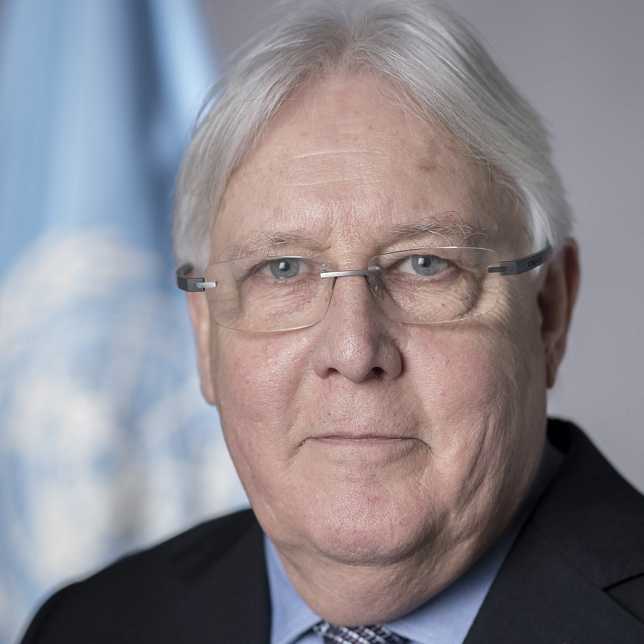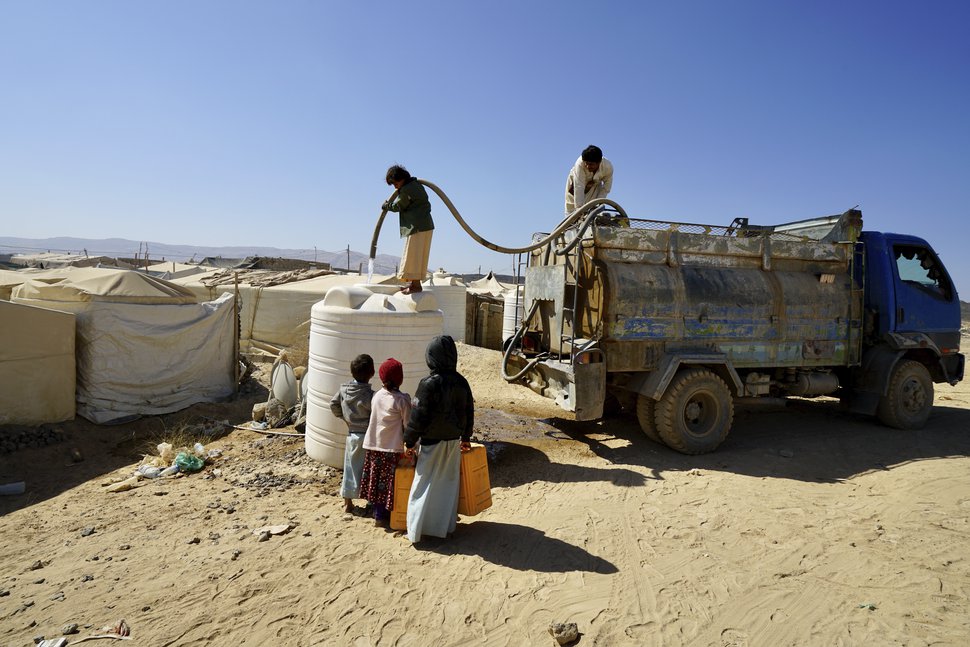Martin Griffiths on UN’s grim humanitarian outlook for 2022
It shouldn’t be a surprise: Many parts of the world are going through dark times. The pandemic casts a long shadow. We are battered by heat, rain and storms, as the climate crisis picks up pace.
The UN and our many partner aid groups estimate that 274 million people need cash, food, medicine, shelter, or other humanitarian help in 63 countries. That’s gone up 17 percent.
Our fundraising appeal presents the price of survival, hope, and dignity for people who have had the sheer accident of birth to be hit by a disaster, get caught up in a war, or be forced on the run.
Al Jafina IDP settlement, Marib, Yemen Photo: OCHA/Giles Clarke
Afghanistan needs the most, USD 4.5 billion, while helping people cope with drought and conflict in Ethiopia requires USD 2.8 billion, and major refugee programmes cost some USD 10 billion.
Our plans are based on hard socio-economic evidence, they avoid duplication and are cost-conscious. Recognising we can’t do everything, we are aiming to help two thirds of the people most at risk of death or destitution.
The humanitarian work of the UN and its partner organisations tackles a wide range of circumstances and has real life-and-death impact. This year we helped ten million Yemenis get health care and stopped famine in South Sudan. We are getting smarter and more efficient, increasing the use of money transfers and getting help to people before a crisis hits. We know that women face different impacts than men in disasters and war: they are much more vulnerable to sexual violence and have to work harder for economic survival.
Projects can be very specific, for example a safe house for survivors of sexual violence in Ethiopia I visited recently. It’s simple, rooted in the local community and literally a lifesaver for the women I met who had been abused in a bitter civil war.
Other line items in our 2022 plan can put food on the table for about half of Afghanistan, keep Syrian refugees warm in winter, help vaccinate millions in Myanmar against COVID-19, or keep children in school after an earthquake or typhoon. We can provide psychosocial, legal, and medical help to women in Nigeria navigating the effects of conflict.
We are grateful for the resources raised in 2021: USD 17 billion were provided to our collective humanitarian responses, most of it from the taxpayers of wealthy countries. It’s particularly generous when COVID-19 is hitting us all hard.
Nevertheless, for 2022 I will be reminding rich countries that the price tag is a tiny fraction of military spending. That letting a virus mutate unchecked in one country will come back to hurt us all. That our grandchildren will not forgive us if we don’t do more to prevent and prepare for climate disasters.
As well as planning and fundraising for a global relief operation, we negotiate with anyone who can keep aid flowing. We give the same message to superpowers, community leaders or armed rebels: give the civilians a chance and let us do our job. Creative humanitarian negotiations are key, and something I focus on whenever aid is blocked.
We have a grand coalition of humanitarian responders, from niche community-based organisations to the heavy-duty UN specialist agencies. I am proud and honoured to work with this diverse and dedicated community of aid workers, most coming from the communities they serve.
To enable them do their jobs, we need governments, businesses, foundations and individuals to get behind the requirements laid out in our 2022 Global Humanitarian Overview published today.
Alongside keeping up with fast-moving emergencies, I know the aid enterprise itself needs a good look in the mirror. We must do better in listening to affected people and including them in decision-making. The international aid system should show more humility and respect when working with local institutions, stepping aside when it’s not needed. We must combat racism and colonial thinking in our organisations. Those attitudes betray our values and can fatally undermine our legitimacy. We must also police ourselves much more firmly on abuse and misconduct.
 Modern humanitarian relief traces its roots to the bloody European wars of the nineteenth century. But helping those in need is a constant across cultures and religions. It’s part of being human. We are all humanitarians.
Modern humanitarian relief traces its roots to the bloody European wars of the nineteenth century. But helping those in need is a constant across cultures and religions. It’s part of being human. We are all humanitarians.
Rich countries have poured trillions into COVID-19 measures like unemployment benefits, or free vaccinations – humanitarian relief for their own citizens, you might say. Compared to that spending, our $41 billion appeal is barely a rounding error. The long-term solution for many places mentioned in our appeal may be a peace agreement, or painstaking economic development. In the meantime, our humanitarian work is a vital stop-gap, a furlough for lives.
For that, there is no price tag too high.
Martin Griffiths, UN Under Secretary General for Humanitarian Affairs. Photo: OCHA

